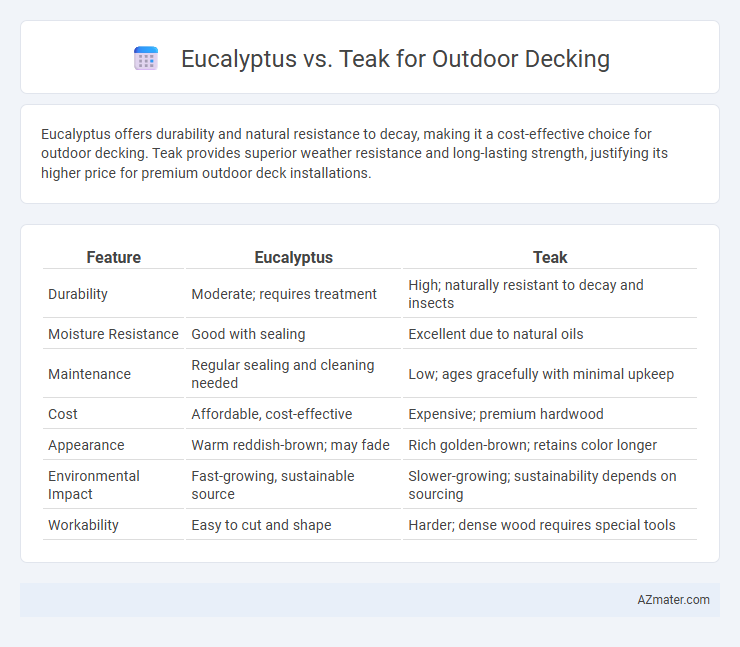Eucalyptus offers durability and natural resistance to decay, making it a cost-effective choice for outdoor decking. Teak provides superior weather resistance and long-lasting strength, justifying its higher price for premium outdoor deck installations.
Table of Comparison
| Feature | Eucalyptus | Teak |
|---|---|---|
| Durability | Moderate; requires treatment | High; naturally resistant to decay and insects |
| Moisture Resistance | Good with sealing | Excellent due to natural oils |
| Maintenance | Regular sealing and cleaning needed | Low; ages gracefully with minimal upkeep |
| Cost | Affordable, cost-effective | Expensive; premium hardwood |
| Appearance | Warm reddish-brown; may fade | Rich golden-brown; retains color longer |
| Environmental Impact | Fast-growing, sustainable source | Slower-growing; sustainability depends on sourcing |
| Workability | Easy to cut and shape | Harder; dense wood requires special tools |
Introduction to Eucalyptus vs Teak for Outdoor Decking
Eucalyptus and teak are popular hardwood choices for outdoor decking due to their durability and natural resistance to weather elements. Eucalyptus offers a cost-effective, sustainable alternative with attractive reddish-brown hues and a dense grain that withstands moisture and decay. Teak, known for its rich oil content and exceptional hardness, provides superior resistance to rot, insects, and UV damage, making it a premium option for long-lasting outdoor decks.
Wood Characteristics: Eucalyptus and Teak Compared
Eucalyptus wood is dense, durable, and resistant to termites and decay, making it a popular budget-friendly option for outdoor decking, while its natural reddish-brown color weathers to a silver-gray patina over time. Teak is renowned for its exceptional oil content, providing superior water resistance and natural ability to repel pests, ensuring longevity and minimal maintenance for outdoor applications. Both woods offer strength and durability, but teak generally outperforms eucalyptus in resistance to environmental elements and retains its rich golden-brown color longer.
Durability and Weather Resistance
Eucalyptus wood offers moderate durability and natural resistance to decay, making it a cost-effective choice for outdoor decking but may require regular maintenance to prevent weather damage. Teak excels in durability with high natural oil content that provides exceptional resistance to moisture, rot, and insect attacks, ideal for long-lasting outdoor use. Its dense grain structure enhances weather resistance, allowing teak decks to withstand harsh environmental conditions with minimal upkeep.
Maintenance Requirements and Longevity
Eucalyptus decking requires regular oiling and sealing to maintain its durability and resist weathering, while teak naturally contains high oil content that reduces the need for frequent maintenance. Teak offers exceptional longevity, often lasting 25 to 40 years with minimal upkeep, whereas eucalyptus typically lasts 15 to 20 years when properly maintained. Both woods benefit from periodic cleaning, but teak's natural resistance to moisture, rot, and insects makes it a superior choice for long-term outdoor decking durability.
Aesthetic Appeal and Color Changes Over Time
Eucalyptus offers a warm, reddish-brown hue that deepens beautifully with age, creating a rich, natural patina ideal for outdoor decking. Teak's golden-brown color weathers into a sophisticated silver-gray if left untreated, maintaining its luxurious appeal while developing a distinct character. Both woods provide striking aesthetics, but eucalyptus's evolving warm tones contrast with teak's classic, weathered finish to suit diverse outdoor design preferences.
Cost Comparison: Eucalyptus vs Teak
Eucalyptus offers a significantly lower cost for outdoor decking compared to teak, making it a budget-friendly alternative for large projects. While teak's premium price reflects its superior natural durability and resistance to weathering, eucalyptus provides a cost-effective balance of strength and longevity with proper treatment. Investing in eucalyptus can reduce initial expenses by up to 50% compared to teak, appealing to homeowners seeking quality without the high financial commitment.
Environmental Impact and Sustainability
Eucalyptus offers faster growth rates and higher carbon sequestration compared to teak, making it a more renewable choice for outdoor decking. Teak is naturally resistant to pests and weather, reducing the need for chemical treatments that can harm ecosystems. Choosing sustainably harvested eucalyptus certified by organizations like FSC ensures lower environmental impact and supports responsible forestry practices.
Installation and Workability
Eucalyptus offers excellent workability with its moderate hardness, allowing for easier cutting and nailing during outdoor decking installation, and it adapts well to various fastening methods without splitting. Teak, known for its natural oils and high density, requires specialized tools and pre-drilling to prevent damage during installation, but its durability and resistance to weather make it a preferred choice for long-lasting decks. Both woods demand proper handling, yet eucalyptus is typically faster to install due to its lighter weight and machinability, while teak ensures superior longevity despite more complex workmanship.
Common Applications in Outdoor Decking
Eucalyptus and teak are both popular choices for outdoor decking due to their durability and resistance to weather conditions. Eucalyptus offers a cost-effective alternative with good natural oils that protect against rot and insects, making it suitable for residential patios and garden decks. Teak's dense grain and high oil content provide superior durability and low maintenance, commonly used in high-end outdoor spaces, commercial decks, and poolside areas where long-lasting performance is critical.
Pros and Cons Summary for Decision Making
Eucalyptus offers high natural durability and fast growth, making it a cost-effective and eco-friendly choice for outdoor decking, but it may require regular maintenance to prevent weathering and cracking. Teak provides exceptional resistance to water, decay, and insects, ensuring long-lasting, low-maintenance decks with a rich, attractive grain, although its higher price and slower growth can limit affordability. Choosing between eucalyptus and teak depends on budget constraints, desired longevity, and willingness to invest in upkeep.

Infographic: Eucalyptus vs Teak for Outdoor Decking
 azmater.com
azmater.com